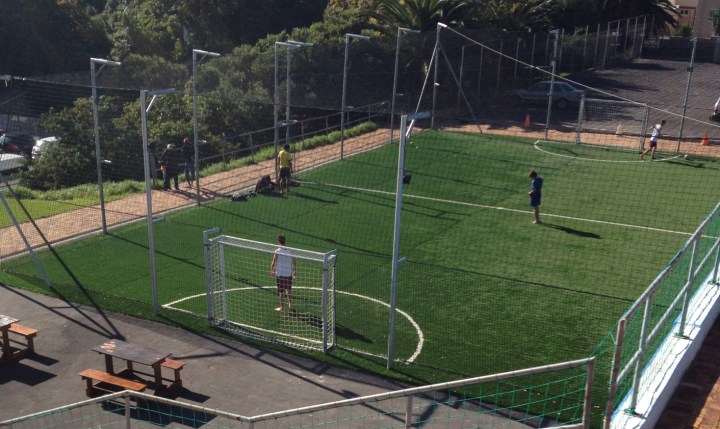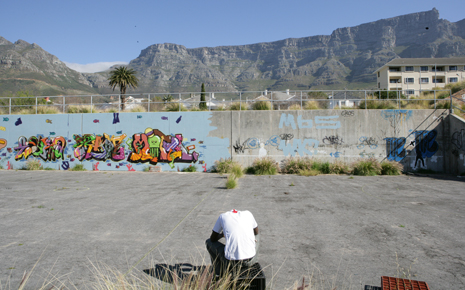South Africa
Cape Town: Red tape means red card for community soccer initiative

It could have been a great example of the capacity of the private sector to contribute towards social upliftment. Instead, the saga of African Brothers Football Academy appears to demonstrate only how social change can be hamstrung by bureaucracy. By REBECCA DAVIS
The African Brothers football team was founded in 1996 by former Orlando Pirates goalkeeper Craig Hepburn and his friend Siphiwe Cele in the “invisible suburb” of Imizamo Yethu, the township in Hout Bay. Their coaching and training was initially limited to the township, but Hepburn had more ambitious plans: to launch a flagship football academy in the centre of Cape Town that would bring world-class soccer facilities to school pupils who previously lacked access to anything of the kind.
He identified the neglected football fields of Gardens Commercial High School as a possible site for this initiative, and pitched the idea to the school. African Brothers would take over their previously derelict sports grounds, turn them into a pristine sporting environment and provide “formerly homeless youths, ex-convicts and refugees with skills and work opportunities”. These would include positions like ground staff and coaches. The school would have first access to the facility whenever they needed it for their own soccer training and games against neighbouring schools.
It took seven years of negotiation with the school’s governing body, but in 2009 an agreement was reached. That year was the perfect time for such an initiative: excitement around the 2010 World Cup was growing, and the idea that soccer could be harnessed as a tool for social empowerment was very much in vogue. Gardens Commercial High would lease African Brothers their playing fields for five years, for free, in exchange for the maintenance and improvement of the facility.
“The lease protected the school’s governing body, in that if we didn’t achieve the agreed-upon development goals, they could curtail the lease,” Hepburn explains. “But we’ve exceeded that.”
Looking at photos of the before-and-after of the facilities, it’s clear that the transformation has been dramatic. Before African Brothers leased the premises, there were piles of rubble, overgrown grass, disused, net-less tennis courts and changing rooms with holes in the ceiling. Now there are manicured playing fields, glossy floodlit Astroturf arenas, and clean, repainted toilets. Murals of soccer icons adorn the perimeter. In total, there has been an investment approaching R2-million in the facility.
“The broader vision was to make it a sustainable facility that could fund itself,” says venture capitalist Pieter Wesselink. They decided that the best way of doing this was to erect five-a-side football courts. “We reasoned that if we put up these five-a-side courts as part of the plan in terms of the coaching, it’s an ideal platform for kids: it’s safe, it’s contained, and the ball is in play at all times. And then we could lease these courts out at night to paying members of the public, which would fund the running of the whole facility.”
Eighteen months ago, two five-a-side courts were built on Gardens Commercial High’s unused tennis courts. A parent whose son was involved in the coaching academy contributed the money for the third court, and Investec bought a sponsorship board on the back of it. During the day, the facilities were used for free by about 20 schools. At night, amateur leagues, corporates and individuals rented out the five-a-side courts.
“The financial model worked really well. We were able to provide facilities for the academy to kids who can’t afford to pay – there are some who can afford it, from the community round here – and we started making enough money to pay the coaches and maintain the field,” says Wesselink. He estimates that the monthly bill to keep the fields tidy, maintained and fertilised comes to R15,000, before the cost of coaches, equipment and so on is factored in.
African Brothers say that the evening pay-for-play sessions amount to only 20% of what they do. “For us, the evening play is a means to an end,” says Wesselink. But it’s this commercial aspect of the academy that has caused all the trouble this year.
“We started getting complaints from neighbours. Noise levels, to begin with, and later, light pollution was a complaint as well.” Through a process of negotiation with neighbours, African Brothers agreed to stop play at night on the top courts at 19:00 to resolve these issues. But Western Cape MEC for education Donald Grant was getting complaints too, so a meeting was set up between African Brothers and the Western Cape education department to attempt to resolve the issue.
During the meeting, the education department informed African Brothers that there was a concern that the academy was operating outside the “consent of use” that Gardens Commercial High has over the fields, due to the business aspect of operations. At a subsequent meeting with the city council, this view was reiterated: the fields fall within a residentially-zoned area. The council suggested, however, that African Brothers submit an application for a temporary zoning departure, eligible for five years and renewable at the city’s discretion.

The academy duly set about preparing an application, but in mid-March a notice to shut down within 30 days arrived. When the academy received the city’s closure notice, they immediately started canvassing the neighbours. The inhabitants of a neighbouring apartment block wrote a letter to the mayoral office to register their concern at the possibility of the academy’s closure.
Before the academy’s launch, they wrote, “Cars were regularly burglarized as were homes, the perpetrators often escaping into the disused athletic ground. Since the Academy started using the grounds, the crime has virtually disappeared from our area.
“The facilities and sports areas have been beautifully rehabilitated and kept clean and sanitary. The grass soccer field is a model of green inner-city space when it was previously overgrown and laden with trash. In place of the sound of smashing glass and police sirens we now have the enthusiastic shouts of young people enjoying sport. This has been an amazing transition appreciated by all.”
The academy claims that incidents of police call-outs in the area as a result of crime have dropped by 90% since the academy started up.
The neighbours’ letter failed to have any effect, and the academy’s appeal for a stay of execution on the grounds that they were mid-application for a re-zoning was rejected. Then a further obstacle was revealed: in order to submit an application for temporary re-zoning, the academy needed to be granted power of attorney from the landowner – who happened to be the province. The provincial department of public works declined to grant the academy power-of-attorney status on the grounds that the application was not for the purposes of education. The academy believes that it could only have come to this conclusion after being advised in this regard by the Western Cape education department.
“The last we heard was that (education MEC) Donald Grant is not issuing us with power of attorney, and will never, and they must close their file,” says Wesselink. “And that’s where we sit.”
Though it does seem understandable that the province would feel uneasy about giving a private enterprise legal control over its land, the academy argues that the province isn’t looking at the bigger picture. They contend that 80% of their initiative is focused purely on education, in terms of providing coaching and facilities to schoolkids. Hepburn rattles off a list of local schools which lack any sporting facilities and have come to depend on the fields of Gardens Commercial High to play their fixtures.
The academy says there is simply no feasible financial way for them to be able to provide these services to the local community without running their pay-for-play programme in the evening. “If we were told: You’re operating illegally, we’re going to take back the campus and fund it to continue, that would be one thing,” says Wesselink. “We’ll stop pay-for-play tomorrow if they would give us the funding to manage their fields.”
When the Daily Maverick contacted the education department for comment, Grant’s spokeswoman, Bronagh Casey, passed the buck to another department: “The only competent authority to support a re-zoning on provincially owned land rests with the Western Cape department of transport and public works,” she said. “The business operations (of African Brothers) are being carried on in defiance of applicable municipal laws – not legislation that falls under the control of the Western Cape education department.”
Public Works head Hector Elliot seemed to disagree that the onus to re-zone was on his department, saying that “no formal application has come before (public works & transport) MEC Carlisle. A decision in such a matter can in any case only come from the city of Cape Town. However, the department supports the Western Cape education department’s position on this matter.”
There is clearly a frustrating amount of pushing-from-pillar-to-post going on here. One surprising aspect is that none of the provincial representatives who spoke to the Daily Maverick voiced what would seem to be one legitimate concern about the case, namely the potential of setting a precedent for land to be sold or leased off to less socially focused commercial enterprises, or the gradual encroachment on the state’s land through zoning modifications.
The saga may seem like a parochial zoning dispute, but Wesselink and Hepburn believe there is a bigger issue at stake. “The model that was designed here was actually to take pressure off government resources, so that it could fund itself,” says Hepburn. They point out that this kind of public-private partnership is well established in the UK, where the Power League sees 48,000 people playing soccer a week, primarily on school properties – a successful business model for over 15 years. “Kids use them during the day, clubs use them at night. It makes sense.”
They believe that the kind of obstacles they have faced are a major disincentive for anyone wanting to participate in social entrepreneurship in South Africa. “I’m involved in a whole lot of social investment, and my biggest complaint is the lack of recognition at a political level that there needs to be collaboration between civil society and government, especially on social issues,” says Wesselink.
He also holds that unless there is an openness to these kinds of interventions from the private sector, apartheid’s divides will continue to manifest in the appearance of South African cities and their schools. “Under apartheid, the white schools got the facilities. Now they’ve got the money to maintain those facilities because they charge their pupils fees. Black schools never had facilities, and they’ll never get them because there’s no money for it, and if they did, they can’t maintain them because there’s no money. Here we have a system that can turn that around, and the only way to test that is to say: give us permission.” DM
Read more:
- Football academy is booted out, in the New Age
Main photo: Gardens Commercial High sports fields
Photo 02: Gardens Commercial High sports fields before being take over by the Academy

















 Become an Insider
Become an Insider